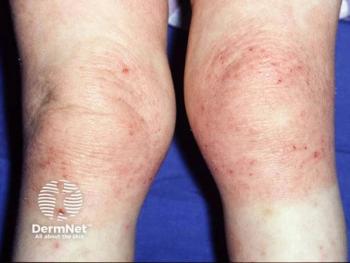
Lifestyle Factors Influencing Treatment Plans
Brad Glick, DO, MPH, says it is essential to consider patient lifestyles when choosing atopic dermatitis therapies.
Episodes in this series

In the Dermatology Times Expert Perspectives series "Advancements in Atopic Dermatitis: Insights from the 2024 Masterclasses in Dermatology Conference," leading dermatologists discuss the advancements in treatments and data for atopic dermatitis (AD) with hand-foot involvement, diversity in clinical trials, and pearls from the American Academy of Dermatology's (AAD) AD treatment guidelines.
In this episode, Brad Glick, DO, MPH, of the Glick Skin Institute in Margate and Wellington, Florida, says it is essential to consider patient lifestyles when choosing atopic dermatitis therapies. He delves into his worth with athletes, particularly runners, and the systemic therapeutics he utilizes with them to keep them on track with treatment and athletic goals.
Episode Transcript
Glick: We have very different parameters when we're thinking of pediatric population compared to an adult population. You know, what about someone who travels a lot? They've been out of the country for a while. They have jobs where they're on planes a lot. Maybe get a little bit inconvenient, or injectables are a concern, as one example. But oral therapies are not always the best for everyone because it requires compliance and adherence.
Patient choice is huge. Patient preferences are huge, but the nice thing, considering AAD guidelines for AD, which we finally have now brand new ones--we haven't had them since 2014. We have choices now. Topical therapies, oral systemic therapies. And now injectable therapies, including 2 new biological therapies and so, patient choice and preference come into this a lot. Impact on quality of life plays into this a lot. Your occupation, extracurricular activities, all play a very significant role in an individual's choice. And their preferences for such choices, patient lifestyles, there's activities of daily living or extracurricular activities that are really important considerations when we're choosing a therapy.
Let me use some examples. And one in particular--athletes, particularly runners. You know, if you're taking care of an adult with AD, who's pretty extensive disease, maybe there is some involvement in their [skin] folds. You know, head and neck eczema, the neck is often involved. You know, trying to run, trying to exercise, trying to lift weights is really challenging. So clearing disease, having for instance, in my campus, systemic therapeutics would be crucial in that particular situation. But I think athletes in general, we really have to hit them very hard with the therapies that we choose. And selecting a topical alone is probably not going to be enough. But of course, we're using these therapeutics collaboratively. I think for me, athletes and individuals participating in sports, it could not be more important. Sweating, and just the irritancy factor, that they experience particularly in areas as I alluded to, like skin folds [can be painful].
Transcript edited for clarity
Newsletter
Like what you’re reading? Subscribe to Dermatology Times for weekly updates on therapies, innovations, and real-world practice tips.
















